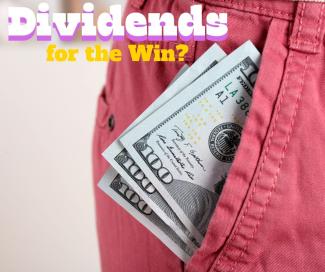
Dividends for the Win?
By Gary Silverman
When it comes to stocks, people seem to like dividends. This is understandable since if a stock pays dividends, regardless of what the markets are doing, you get some cash coming into your portfolio every quarter (stocks that pay dividends typically pay every three months).
Investment management companies know this and have created a myriad of mutual funds and ETFs packed full of various kinds of dividend paying stocks. This is understandable since they really don’t care what kind of fund you want to buy as long as you buy it from them.
But does an emphasis on dividend paying stocks make sense? Not really.
To prove this, I need to get into a bit of math, reference several studies, bring up counter-studies, detail the arguments against those counter-studies, and to make it a bit more understandable add in several charts and graphs.
I don’t have the room for that. So instead, we’ll just look at this logically. If a company has excess cash on hand, they have several things they can do with it. If they’ve borrowed money, they could pay it back. If there’s a synergistic company out there, they could buy it and bring it in the fold. They could do more research and development to create new products and services. They could expand their factories or salesforce. Or they could send the money back to their shareholders in the form of dividends.
If you look at the last paragraph, all except the last one can make the company more profitable. A more profitable company is a more valuable company—and that translates to a higher stock price. A company paying out dividends is generally going to have less growth.
Which would you rather have, cash in your pocket or have your investment go up in value? The answer is: it doesn’t matter too much. And if you boil down all the studies that’s what you find. Dividend paying companies are no better or worse than non-dividend paying ones.
“But Gary”, you might say, “I’ve read that dividend paying companies do better than those that don’t pay dividends.” That’s true of some, yes. However, if you further examine it, the reason isn’t because they pay dividends, it’s because they are healthier companies. If your company is going through hard times one thing you’re likely not to do…or stop doing…is paying a dividend.
There are several factors that have proven over the long run to be decent predictors of a stock’s total return: Size, Value, Profitability, and Momentum. Dividend paying isn’t one of them. That’s why, if you take two companies that are similar in most all respects except that one pays dividends and one doesn’t, you’ll end up making the same profit. From one it will all be due to capital gains (the increase in the stock’s price) and the other will be a combo of that and dividends.
That’s why I’m agnostic to the dividend payout of a stock when deciding if it fits in my portfolio. But it also means that if you really want those dividends, it’s not going to hurt either.

